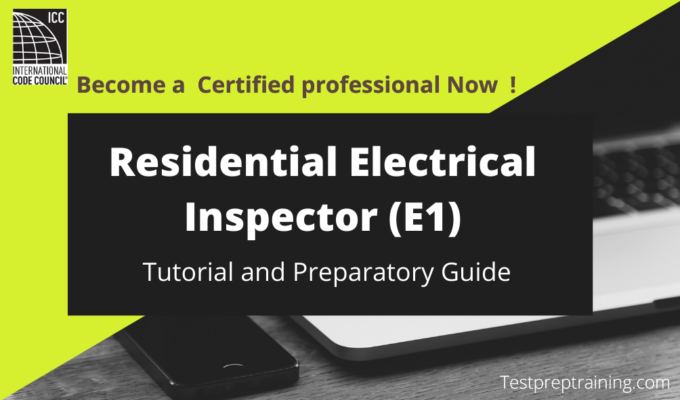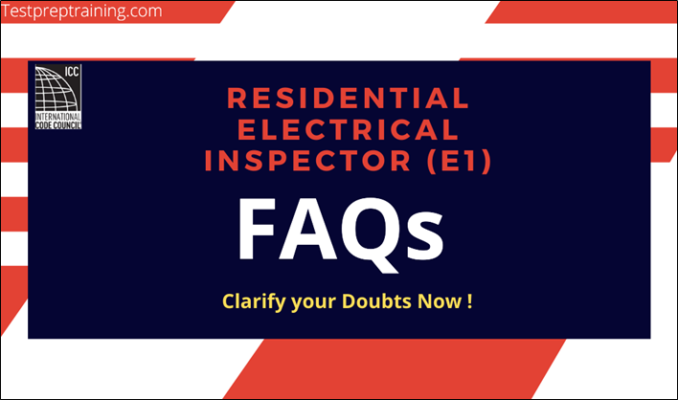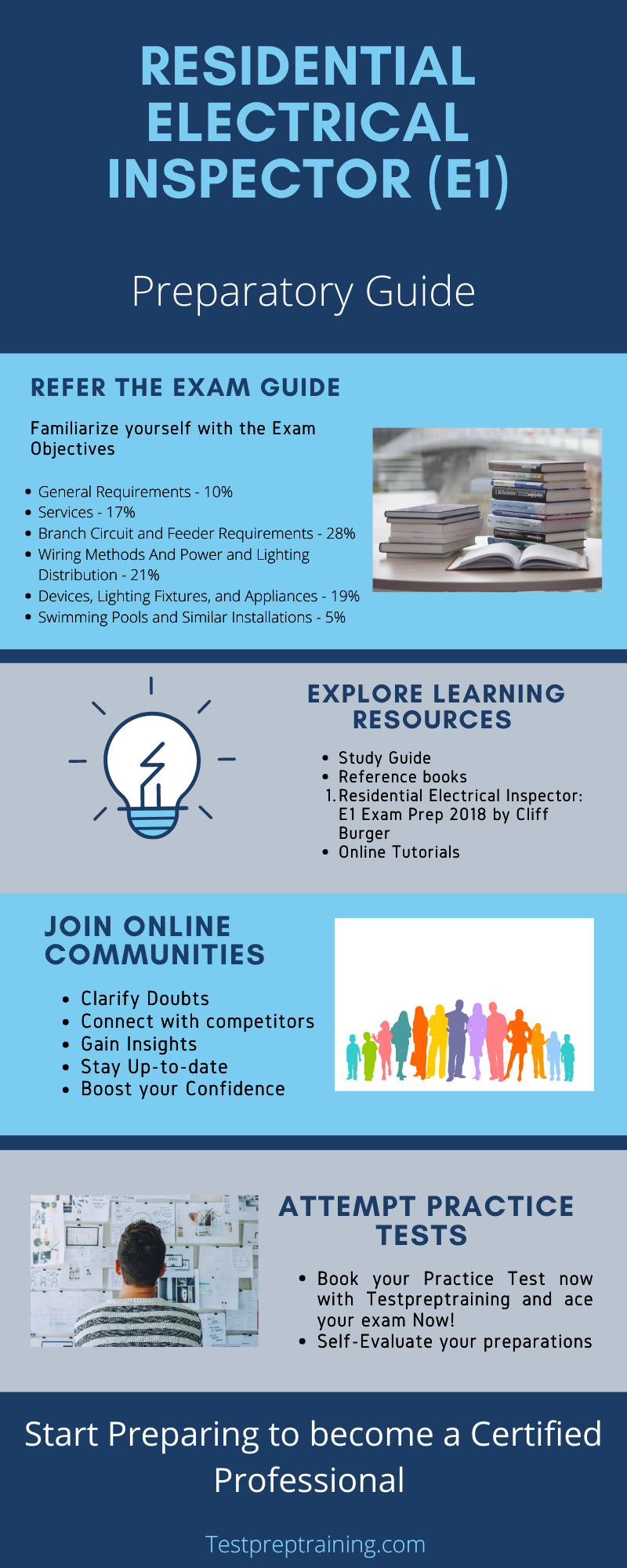Residential Electrical Inspector (E1)

The Residential Electrical Inspector (E1) is responsible for performing inspections of the installation or alteration of electrical systems indoors and outdoors including services, conductors, equipment, components, fixtures, appliances, devices, and electrical appurtenances for one‐ and two‐family dwellings limited to 120/240 volts, single phase, up to 400 amperes.
Exam Prerequisites
There are no Prerequisites required to give the Residential Electrical Inspector (E1) exam
Residential Electrical Inspector (E1) Exam Format
Before getting started with your preparation for the Residential Electrical Inspector (E1) Exam, you should have complete knowledge about the exam details. This would not only give you a clear idea about the exam format but also help you devise a clear and focused study plan to help you with your preparation. This Certification is the roadmap to your success but before that lets understand the exam details.
The Residential Electrical Inspector (E1) is a National level exam with Exam Id- E1. It consists of 60 questions. And, the Residential Electrical Inspector (E1) exam questions will be multiple-choice questions. The exam format is open book in an online proctored platform and you are given 2 hours to complete the exam. The cost of the exam is $219 USD.
| Exam Name | Residential Electrical Inspector |
| Exam ID | E1 |
| Exam Type | National/All |
| Category | Electrical, Residential Inspector |
| Code Year | 2018 |
| Total Questions | 60 Multiple Choice Questions |
| Exam Duration | 120 minutes |
| Exam Format | Open book ( Online proctored) |
| Price | $219 USD |
Scheduling the Exam
Now, let us look at the registration process for Residential Electrical Inspector (E1) exam
Registration Process
- Before making an exam purchase you must first register with ICC. If you already have an account, login to your myICC account to make an exam purchase.
- You will be required to pay for your exam first before you can schedule if you are taking a National Certification, California, or UST/AST exam via CBT or PRONTO. But don’t worry–you’ll have one year to officially schedule or reschedule your purchased exam without paying for your exam again.
Exam Retake
- For National and UST/AST Certification Exams, you will have six exam attempts within a six-month period.
- Once you have attempted an exam six times, you must wait six months from the first attempt to register again.
- You are responsible for paying the exam fee at every attempt.
Identification
- You must enter your first and last LEGAL NAME exactly as it appears on the identification you will present before testing. If there is not an exact match, you will not be able to take your test and you will not be reimbursed for any fees paid.
- You must have your government-issued photo identification ready to show the proctor (e.g. driver’s license, passport). The identification must:
- Have the same legal first name and last name that matches your exam record
- Your exam purchase should not be expired
- Have a signature
Residential Electrical Inspector (E1) Exam FAQs
Get all your doubts and queries resolved with Residential Electrical Inspector (E1) Certification Tests FAQs

Residential Electrical Inspector (E1) Course Outline
The second most important step while preparing for an exam is to understand the course outline after all it is what the question paper will be based on. Getting an idea about the course outline not only helps you in devising a productive study plan but also gives an idea about the exam objectives. These objectives are most often assigned a weighting value which indicates the relative importance of each objective on the exams. Objectives with higher weights cover more questions in the exam. The Residential Electrical Inspector (E1) Exam Outline includes 6 topics. Therefore, it is advisable to go through the course outline thoroughly to achieve the certification keeping in mind their weightage.
Exam Topics
The Residential Electrical Inspector (E1) exam cover the following topics –
- General Requirements – 10%
- Services – 17%
- Branch Circuit and Feeder Requirements – 28%
- Wiring Methods And Power and Lighting Distribution – 21%
- Devices, Lighting Fixtures, and Appliances – 19%
- Swimming Pools and Similar Installations – 5%
01 General Requirements 10%
0101 Project Administration 1%
Verify that required permits are issued and valid. Verify that the required approved plans and specifications are available when required and retained by the building official for the period required.
0102 Public Information and Legal 1%
Communicate the intent of the code using proper terminology. Answer questions about general code compliance, procedures, and materials. Identify the suitability of the installation of materials according to the listing and labeling. Communicate issues and maintain inspection reports,
correction notices, stop work orders, and data for the issuance of the certificate of occupancy
0103 Electrical Theory 2%
Apply basic electrical theory to determine loads and circuit ampacities for safe installation of electrical systems.
0104 Clearances and Guarding 2%
Determine required working clearances, location, access, and guarding requirements for electrical installations.
0105 Connections and Splices 2%
Verify that conductor connections, splices, and terminal identification meet code requirements.
0106 Conductors 2%
Inspect conductors to verify correct use, type, insulations, markings, and ampacity.
02 Services 17%
0201 Service Size and Rating 8%
Inspect services to verify required conductor ampacity, clearances, location, materials, and equipment.
0202 Service Grounding and Bonding 9%
Verify size and type of conductors and electrodes, including location and installation. The Residential Electrical Inspector is responsible for performing inspections of the installation or alteration of electrical systems indoors and outdoors including services, conductors, equipment,
components, fixtures, appliances, devices, and electrical appurtenances for one‐ and two‐family dwellings limited to 120/240 volts, single phase, up to 400 amperes.
03 Branch Circuit and Feeder Requirements 28%
0301 Feeders 5%
Inspect feeders to verify conductor size, clearances, location, materials, and grounding conductors.
0302 Branch Circuit and Feeder Calculations 6%
Verify that the load to be placed on branch circuits and feeders meets code provisions for the conductor, devices, materials, and equipment installed.
0303 Branch Circuit Ratings and Overcurrent Protection 7%
Verify correct size, type, location, and installation of overcurrent devices.
0304 Required Branch Circuits 5%
Verify that all required branch circuits are provided.
0305 Panelboards 5%
Verify panelboard rating, circuit identification, overcurrent protection, and correct installation.
04 Wiring Methods And Power and Lighting Distribution 21%
0401 Installation Methods 4%
Verify that installation of all conductors, cables, raceways, and fittings meets code
requirements. Verify that underground wiring meets code requirements.
0402 Branch Circuit Required Outlets 4%
Verify that receptacle and lighting outlets and switches are provided in all required
locations.
0403 Branch Circuits – GFCI 4%
Verify that ground‐fault circuit interrupter protection is provided in all required locations.
0404 Boxes and Enclosures 3%
Verify that boxes are of proper type and correctly sized and installed.
0405 Equipment Grounding 3%
Verify equipment bonding and grounding conductor sizes, connections, and installation.
0406 Flexible Cords 2%
Verify proper use and sizing of flexible cords.
0407 Class 2 Circuits 1%
Inspect low voltage control wiring, Class 2 circuits, and fire alarm circuits.
05 Devices, Lighting Fixtures, and Appliances 19%
0501 Switches and Receptacles 6%
Verify that switches and receptacles are of the correct type and rating and are installed properly.
0502 Light Fixtures 4%
Verify that light fixtures and fixture wires are of correct type and rating and are properly installed.
0503 Appliances 5%
Inspect appliance wiring and equipment to verify correct type, use, installation, and disconnecting means.
0504 Heating and Cooling Equipment 4%
Inspect space heating and cooling equipment, including air conditioning and refrigeration wiring and equipment, to verify correct type, use, installation, and disconnecting means.
06 Swimming Pools and Similar Installations 5%
0601 Swimming Pool Wiring 5%
Verify proper installation of swimming pools, spas, hot tubs, hydromassage bathtubs, etc.
Preparatory Guide for Residential Electrical Inspector (E1)
Preparing for any exam is not an easy task. It requires a lot of hard work consistency and dedication. It is the key to a bright and successful future. However, the Residential Electrical Inspector exam is not something that can be done overnight, it requires a lot of preparation along with time, effort, and focused attention. Our Preparatory Guide here will help you all along your journey and prepare you well using the Residential Electrical Inspector (E1) training and other studies resources.

Step-1 Review the Exam Objectives
Reviewing the exam objectives is an extremely crucial step to ensure that nothing is left out. As mentioned earlier, going through the course outline is really important while preparing for any exam to make sure everything is covered. Furthermore, Familiarising yourself with the exam objectives helps is grasping concepts faster and with accuracy. The Residential Electrical Inspector (E1) certification exam cover 6 topics namely-
- General Requirements – 10%
- Services – 17%
- Branch Circuit and Feeder Requirements – 28%
- Wiring Methods And Power and Lighting Distribution – 21%
- Devices, Lighting Fixtures, and Appliances – 19%
- Swimming Pools and Similar Installations – 5%
Step-2 Discover your Learning Resources
Study Guide
The Residential Electrical Inspector (E1) Study Guide will provide you complete clarity about the exam questions and how to approach them while preparing you from the scratch.
Reference Books
Books are your best friends. Preparation for any exam is incomplete without books. You should always reach out for authentic and credible books written by expert authors to enhance your knowledge. Moreover, sometimes they might as well provide you with detailed insights that the study guides may not cover giving you an extra edge over others. Books like Residential Electrical Inspector: E1 Exam Prep 2018 by Cliff Burger should definitely be on your reading list.
Tutorials
Incorporating the Residential Electrical Inspector (E1) online tutorial in your study plan is the next important step in your preparation. Online Tutorials help you to understand concepts faster and briefly review exam objectives in a more compelling and friendly way. Therefore, they definitely should be a part of your study plan.
Step-3 Join an Online Community
Joining an online community is always beneficial. Being with people who have the same goals as yours helps you stay focused and also widens your spectrum. Additionally, they help you stay up-to-date with the latest revisions and reach out to industry experts and professionals while giving you the right exposure for your expertise. Joining Online Communities will also boost your confidence and self-esteem and aid you during your journey.
Step-4 Practice Tests are your way ahead
Finally, The most important step is to take as many Residential Electrical Inspector (E1) practice tests as possible. No matter how much you prepare, it’s always incomplete without practice tests. Practice Tests helps in assessing your preparation and knowing what your strengths and weakness are. You can use that as the basis for planning the rest of your study by working on key areas. Moreover, you also get to practice your speed and accuracy and boost your confidence. Try outperforming yourself with each subsequent test and earn this certification. Start using Residential Electrical Inspector (E1) practice exam tests Now

